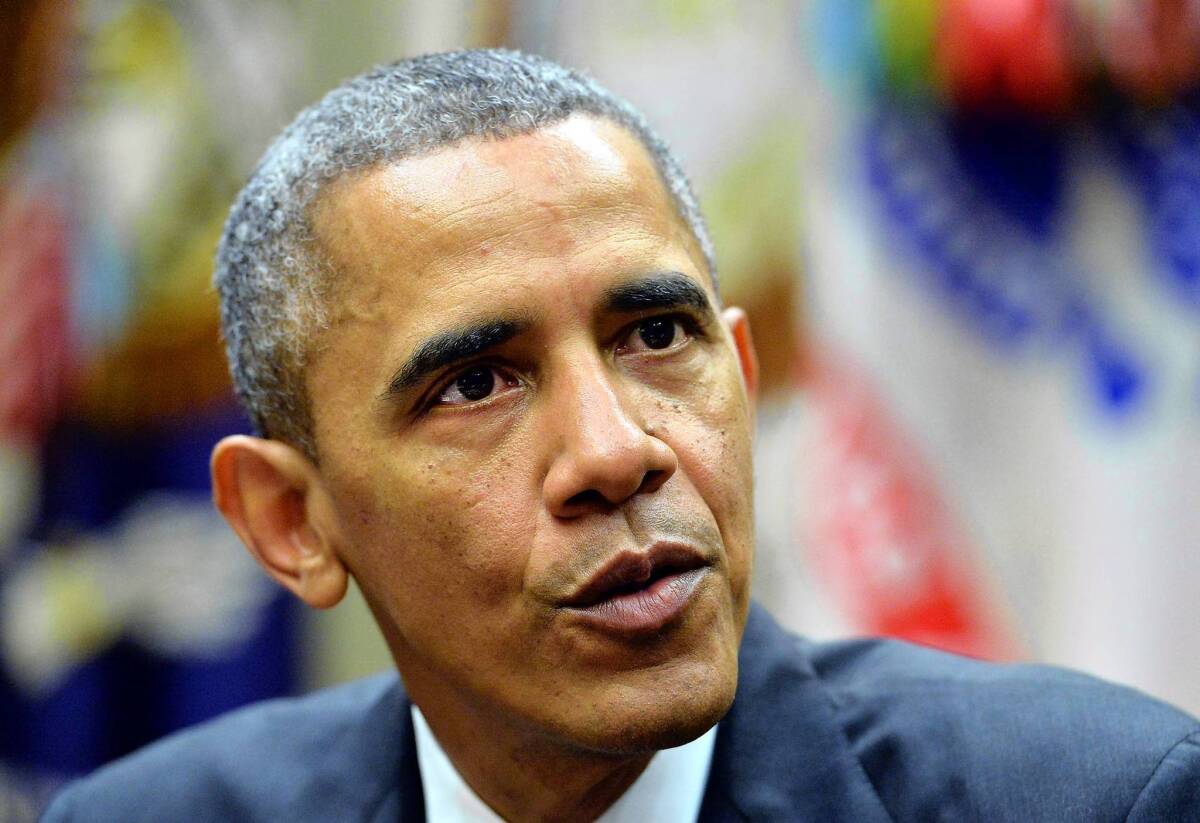Obama on verge of gains in budget dispute, for the short term

- Share via
WASHINGTON — President Obama was poised to claim a victory in the shutdown-and-debt showdown with Republicans as Congress worked toward a deal — except, perhaps, on the one demand he wanted most.
The president’s healthcare law seems likely to emerge unscathed or barely nicked, and he is not offering budget cuts in exchange for a debt limit increase as he did in 2011. But throughout the 15-day government shutdown, Obama has said he is not only trying to resolve this crisis, but to prevent a sequel.
The cycle of lurching from deadline to deadline, crafting fiscal policy under threat of federal default or government shutdown, must end, the president said. He declared he would not negotiate under those threats.
But the deals under discussion in both chambers appear likely to fall short of Obama’s ambitious goal. Rather than breaking the cycle, the proposals set up two new deadlines — moving the action a few months down the road and settling none of the fiscal disputes at the root of much of the brinkmanship.
To get to that point, the White House abandoned its no-negotiation stance and prepared to make concessions aimed at coaxing Republican support to reopen the government and lift the debt limit.
Democrats say those concessions are small enough to reinforce Obama’s insistence that the party not give Republicans major victories in return for a debt limit increase. And if this example doesn’t make the point, Democrats say, then polls showing the public blames the stalemate on Republicans ought to deter them.
Obama, who did a round of interviews with television stations Tuesday, said he saw Senate Republicans recognizing that the shutdown was “bad strategy.”
“I’m pretty sure they’re not going to run this play again,” Obama told WABC-TV in New York.
But the approach under consideration in Congress offers no assurances that it will establish a new normal. On Tuesday, as House Republicans rejected the Senate proposal and tried to move their own, there was little evidence they were prepared to concede.
“Nobody likes kicking the can down the road,” Rep. Scott Perry (R-Pa.) said, “but if the president wants to do that, and he’s got the bully pulpit, and we’re unable to stop him from kicking the can all the way down the road, maybe having him kick it only a couple months down the road is the best we can do.”
Under the Senate proposal, the government would reopen until Jan. 15, giving Republicans and Democrats time to negotiate a broad budget agreement in a conference committee. If no budget deal is reached, another shutdown could occur. On the debt ceiling, the Senate would extend the limit to cover the government’s borrowing until Feb. 7, setting up another debate in the spring.
In a sign that the House was looking ahead to another debt limit fight, Republicans want to take away the Treasury Department’s flexibility to use “extraordinary measures” to keep borrowing after the debt limit is reached, as it has done this time.
House Republicans in this standoff have been frustrated as they game out how much time they have to negotiate and want to “deny bureaucrats the ability to use budget gimmicks to mislead the public about the financial condition of the United States,” according to a summary of the bill circulated by Republican aides.
Despite Obama’s insistence that he would not wheel and deal to reopen the government, the Senate proposal was worked out by wheeling and dealing.
The Jan. 15 date was a Democratic win — ensuring that additional budget cuts set to kick in in January might not be locked in for an extended period of time. The Feb. 7 debt limit extension is a Republican get, in time for the November 2014 election.
The Senate plan includes other policy measures aimed at drawing Republican support — the sort of measures the president initially said he would reject. But over the course of the shutdown, the White House has redefined what it considered “negotiations” and what sort of strings could be attached.
Asked Tuesday whether Obama was negotiating, White House spokesman Jay Carney said, “It depends what you mean by negotiate.”
In recent days, the White House has emphasized that the president objected to “concessions,” not negotiations. The key point, officials said, was to hold firm against the budget cuts and ideological aims that House Republicans sought to achieve by holding up a vote on the debt limit.
Senate Democrats want to reach a broad deficit reduction deal in year-end budget negotiations that would include an increase to the debt ceiling.
Republicans, they hope, will be less likely to dig in on a budget fight after this one has eroded their public approval. But to House Democrats, who have watched the GOP’s conservative lawmakers repeatedly sink deals crafted by Republican leaders, that’s an optimistic view.
Brinkmanship, said Rep. Raul M. Grijalva (D-Ariz.), co-chairman of the Congressional Progressive Caucus, is unlikely to disappear in a few months. “It’s become the mode of operating here, unfortunately,” he said.
kathleen.hennessey@latimes.com
Christi Parsons and Michael A. Memoli in the Washington bureau contributed to this report.
More to Read
Sign up for Essential California
The most important California stories and recommendations in your inbox every morning.
You may occasionally receive promotional content from the Los Angeles Times.











